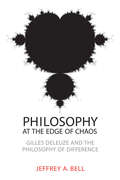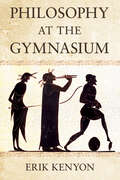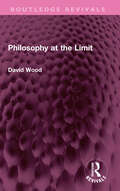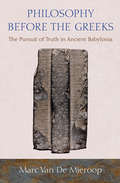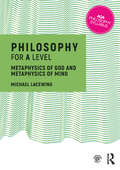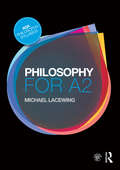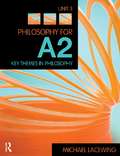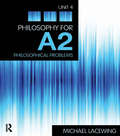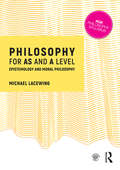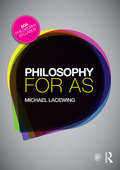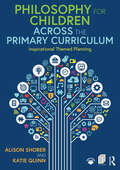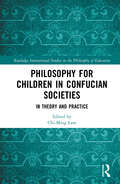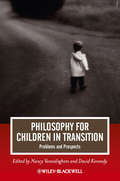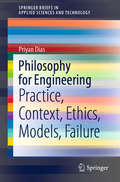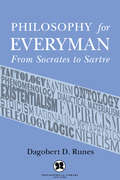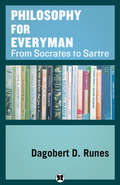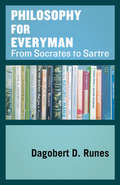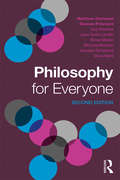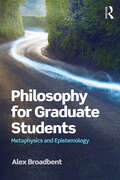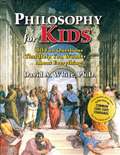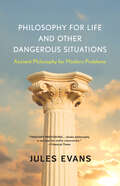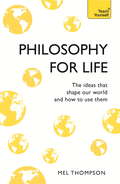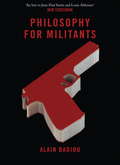- Table View
- List View
Philosophy at the Edge of Chaos: Gilles Deleuze and the Philosophy of Difference
by Jeffrey A. BellFrom the early 1960s until his death, French philosopher Gilles Deleuze (1925-1995) wrote many influential works on philosophy, literature, film, and fine art. One of Deleuze's main philosophical projects was a systematic inversion of the traditional relationship between identity and difference. This Deleuzian philosophy of difference is the subject of Jeffrey A. Bell's Philosophy at the Edge of Chaos. Bell argues that Deleuze's efforts to develop a philosophy of difference are best understood by exploring both Deleuze's claim to be a Spinozist, and Nietzsche's claim to have found in Spinoza an important precursor. Beginning with an analysis of these claims, Bell shows how Deleuze extends and transforms concepts at work in Spinoza and Nietzsche to produce a philosophy of difference that promotes and, in fact, exemplifies the notions of dynamic systems and complexity theory. With these concepts at work, Deleuze constructs a philosophical approach that avoids many of the difficulties that linger in other attempts to think about difference. Bell uses close readings of Plato, Aristotle, Spinoza, Nietzsche, Heidegger, Derrida, and Whitehead to illustrate how Deleuze's philosophy is successful in this regard and to demonstrate the importance of the historical tradition for Deleuze. Far from being a philosopher who turns his back on what is taken to be a mistaken metaphysical tradition, Bell argues that Deleuze is best understood as a thinker who endeavoured to continue the work of traditional metaphysics and philosophy.
Philosophy at the Gymnasium
by Erik KenyonPhilosophy at the Gymnasium returns Greek moral philosophy to its original context—the gyms of Athens—to understand how training for the body sparked training for the mind. The result is an engaging inroad to Greek thought that wrestles with big questions about life, happiness, and education, while providing fresh perspectives on standing scholarly debates.In Philosophy at the Gymnasium, Erik Kenyon reveals the egalitarian spirit of the ancient gym, in which clothes—and with them, social markers—are shed at the door, leaving individuals to compete based on their physical and intellectual merits alone. The work opens with Socratic dialogues set in gyms that call for reform in character education. It explores Plato's moral and political philosophy through the lens of mental and civic health. And it holds up Olympic victors as Aristotle's model for the life of happiness through training.
Philosophy at the Limit (Routledge Revivals)
by David WoodFirst published in 1990, Philosophy at the Limit was originally part of the Problems of Modern European Thought book series. It pursues the theme of philosophy’s confrontation with its own limits, in modern philosophers from Hegel to Derrida, including Nietzsche, Wittgenstein, Heidegger, and Gadamer. The author focuses on questions of philosophical style, dialogue and indirect communication, the structural closure of philosophical texts, and performative strategy in philosophy. The book is an accessible discussion of many of the complex issues that empower continental philosophy. It will appeal to students of philosophy and contemporary thought at every level, and to the general reader interested in the heart of the debates in European thought.
Philosophy before the Greeks
by Marc Van De MieroopThere is a growing recognition that philosophy isn't unique to the West, that it didn't begin only with the classical Greeks, and that Greek philosophy was influenced by Near Eastern traditions. Yet even today there is a widespread assumption that what came before the Greeks was "before philosophy." In Philosophy before the Greeks, Marc Van De Mieroop, an acclaimed historian of the ancient Near East, presents a groundbreaking argument that, for three millennia before the Greeks, one Near Eastern people had a rich and sophisticated tradition of philosophy fully worthy of the name.In the first century BC, the Greek historian Diodorus of Sicily praised the Babylonians for their devotion to philosophy. Showing the justice of Diodorus's comment, this is the first book to argue that there were Babylonian philosophers and that they studied knowledge systematically using a coherent system of logic rooted in the practices of cuneiform script. Van De Mieroop uncovers Babylonian approaches to knowledge in three areas: the study of language, which in its analysis of the written word formed the basis of all logic; the art of divination, which interpreted communications between gods and humans; and the rules of law, which confirmed that royal justice was founded on truth.The result is an innovative intellectual history of the ancient Near Eastern world during the many centuries in which Babylonian philosophers inspired scholars throughout the region--until the first millennium BC, when the breakdown of this cosmopolitan system enabled others, including the Greeks, to develop alternative methods of philosophical reasoning.
Philosophy for A Level: Metaphysics of God and Metaphysics of Mind
by Michael LacewingPhilosophy for A Level is an accessible textbook for the new 2017 AQA Philosophy syllabus. Structured closely around the AQA specification this textbook covers the two units, Metaphysics of God and Metaphysics of Mind, in an engaging and student-friendly way. With chapters on ‘How to do philosophy’, exam preparation providing students with the philosophical skills they need to succeed, and an extensive glossary to support understanding, this book is ideal for students studying philosophy. Each chapter includes: argument maps that help to develop students’ analytical and critical skills comprehension questions to test understanding discussion questions to generate evaluative argument explanation of and commentary on the AQA set texts ‘Thinking harder’ sections cross-references to help students make connections bullet-point summaries of each topic. The companion website hosts a wealth of further resources, including PowerPoint slides, flashcards, further reading, weblinks and handouts, all structured to accompany the textbook. It can be found at www.routledge.com/cw/alevelphilosophy.
Philosophy for A2: Ethics and Philosophy of Mind
by Michael LacewingPhilosophy for A2 is an engaging textbook for the new AQA A2 Philosophy syllabus. Structured closely around the AQA specification this textbook covers the two units, Ethics and Philosophy of Mind, in a comprehensive and student-friendly way. All of the anthology texts are explained and commented on and woven into the discussion of the syllabus. With chapters on 'How to Do Philosophy' and exam preparation this textbook provides students with the philosophical skills they need to succeed. Each chapter includes: explanation and commentary of the AQA anthology texts comprehension questions to test understanding discussion questions to generate evaluative argument 'going further' sections for advanced study cross-references to help students make connections bullet-point summaries of each topic. The companion website hosts a wealth of further resources, including PowerPoint slides, flashcards, further reading, weblinks and handouts, all structured to accompany the textbook. It can be found at www.routledge.com/cw/alevelphilosophy.
Philosophy for A2: Key Themes in Philosophy, 2008 AQA Syllabus
by Michael LacewingPhilosophy for A2: Unit 3 is the definitive textbook for students of the current AQA Advanced Level syllabus. Structured very closely around the AQA specifications for Unit 3: Key Themes in Philosophy, it introduces the student to each of the core themes: philosophy of mind political philosophy epistemology and metaphysics moral philosophy philosophy of religion. All chapters are helpfully subdivided into short digestible passages, and include: quiz questions to test core knowledge discussion questions to deepen understanding 'going further' sections for advanced study text boxes highlighting key definitions and arguments cross-references to help students make connections lively illustrations, diagrams and a glossary. In addition, a chapter on exam preparation contains a wealth of helpful hints and tips on revision and exam techniques. Written by an experienced philosopher and A Level consultant, Philosophy for A2: Unit 3 is an essential companion for all students of A2 Level philosophy.
Philosophy for A2: Philosophical Problems, 2008 AQA Syllabus
by Michael LacewingPhilosophy for A2: Unit 4 is the definitive textbook for students of the current AQA Advanced Level syllabus for philosophy. Structured very closely around the AQA specifications for Unit 4: Philosophical Problems, Michael Lacewing helps students to engage with and understand the arguments of the five key texts: Hume's An Enquiry Concerning Human Understanding Plato's The Republic Mill's On Liberty Descartes' Meditations Nietzsche's Beyond Good and Evil. All chapters are helpfully subdivided into short digestible passages, and include: quiz questions to test core knowledge discussion questions to deepen understanding 'going further' sections for advanced study text boxes highlighting key definitions and arguments cross-references to help students make connections. In addition, a chapter on exam preparation contains a wealth of helpful hints and tips on revision and exam techniques. Written by an experienced philosopher and A Level consultant, Philosophy for A2: Unit 4 is an essential companion for all students of A2 Level philosophy.
Philosophy for AS and A Level: Epistemology and Moral Philosophy
by Michael LacewingPhilosophy for AS and A Level is an accessible textbook for the new 2017 AQA Philosophy syllabus. Structured closely around the AQA specification this textbook covers the two units shared by the AS and A Level, Epistemology and Moral Philosophy, in an engaging and student-friendly way. With chapters on 'How to do philosophy', exam preparation providing students with the philosophical skills they need to succeed, and an extensive glossary to support understanding, this book is ideal for students studying philosophy. Each chapter includes: argument maps that help to develop student’s analytical and critical skills comprehension questions to test understanding discussion questions to generate evaluative argument explanation and commentary on the AQA set texts ‘Thinking harder’ sections cross-references to help students make connections bullet-point summaries of each topic. The companion website hosts a wealth of further resources, including PowerPoint slides, flashcards, further reading, weblinks and handouts, all structured to accompany the textbook. It can be found at?www.routledge.com/cw/alevelphilosophy.
Philosophy for AS: Epistemology and Philosophy of Religion
by Michael LacewingPhilosophy for AS is an accessible textbook for the new 2014 AQA Advanced Subsidiary Philosophy syllabus. Structured closely around the AQA specification this textbook covers the two units, Epistemology and Philosophy of Religion, in an engaging and student-friendly way. With chapters on 'How to do philosophy', exam preparation providing students with the philosophical skills they need to succeed, and an extensive glossary to support understanding, this book is ideal for students studying philosophy. Each chapter includes: explanation and commentary of the AQA anthology texts comprehension questions to test understanding discussion questions to generate evaluative argument 'going further' sections for advanced study cross-references to help students make connections bullet-point summaries of each topic. The companion website hosts a wealth of further resources, including PowerPoint slides, flashcards, further reading, weblinks and handouts, all structured to accompany the textbook. It can be found at www.routledge.com/cw/alevelphilosophy.
Philosophy for Children Across the Primary Curriculum: Inspirational Themed Planning
by Katie Quinn Alison ShorerThis is an easy-to-use, theme-based resource book for Philosophy for Children (P4C) practitioners in primary school settings. It covers ten popular themes which include many current affair issues and enduring curriculum themes such as artificial intelligence, biodiversity, resilience, and waste. Each theme provides planning for every subject and links to the relevant English national curriculum expectations. Offering ideas for a year’s worth of work, it can be dipped into for inspiration or used for step-by-step sessions. There are links to video clips, websites, and stories that teachers and practitioners can use to base their concept exploration and enquires on. Presenting a range of philosophical ideas, activities, and resources, this book is essential for all primary P4C facilitators excited by embedding and exploring philosophy across the curriculum.
Philosophy for Children Across the Primary Curriculum: Inspirational Themed Planning
by Katie Quinn Alison ShorerThis is an easy-to-use, theme-based resource book for Philosophy for Children (P4C) practitioners in primary school settings. It covers ten popular themes which include many current affair issues and enduring curriculum themes such as artificial intelligence, biodiversity, resilience, and waste.Each theme provides planning for every subject and links to the relevant English national curriculum expectations. Offering ideas for a year’s worth of work, it can be dipped into for inspiration or used for step-by-step sessions. There are links to video clips, websites, and stories that teachers and practitioners can use to base their concept exploration and enquires on.Presenting a range of philosophical ideas, activities, and resources, this book is essential for all primary P4C facilitators excited by embedding and exploring philosophy across the curriculum.
Philosophy for Children in Confucian Societies: In Theory and Practice (Routledge International Studies in the Philosophy of Education)
by Chi-Ming LamThis book contributes to the theory and practice of Philosophy for Children (P4C), with a special emphasis on theoretical and practical issues confronting researchers and practitioners working in contexts that are strongly influenced by Confucian values and norms. It includes writings by prominent P4C scholars from four Confucian societies, viz., Mainland China, Hong Kong, Taiwan, and Japan. These writings showcase the diversity of the P4C model, providing a platform for researchers and practitioners to tell their stories in their own Confucian cultural contexts. The research stories in the first part of the book are concerned with assessing the impact of traditional Confucian norms, promoting critical thinking, reconstructing the notion of community of inquiry, creating moral winds, integrating philosophy into the school curriculum, and localizing teaching methods and materials. Four issues are discussed in the second part of the book: the tension between Confucianism and powerful thinking; cultural challenges for practitioners; the transformation of harmony; and the conception of family. Taken as a whole, the book provides fresh insights into whether and how P4C’s Westerninfluenced theories and practices are compromised when they are applied in non-Western, or rather Confucian, contexts. A must-read for anyone interested in the theory and practice of P4C and Confucianism in general.
Philosophy for Children in Transition: Problems and Prospects (Journal of Philosophy of Education #24)
by David Kennedy Nancy VansieleghemPhilosophy for Children in Transition presents a diverse collection of perspectives on the worldwide educational movement of philosophy for children. Educators and philosophers establish the relationship between philosophy and the child, and clarify the significance of that relationship for teaching and learning today. The papers present a diverse range of perspectives, problems and tentative prospects concerning the theory and practice of Philosophy for Children today The collection familiarises an actual educational practice that is steadily gaining importance in the field of academic philosophy Opens up discussion on the notion of the relationship between philosophy and the child
Philosophy for Engineering: Practice, Context, Ethics, Models, Failure (SpringerBriefs in Applied Sciences and Technology)
by Priyan DiasThis book highlights the unique need for philosophy among engineers, which stems from issues regarding their knowledge (epistemology), role or being (ontology) and influence (ethics). It discusses practice, context, ethics, models and failure as key aspects of engineering, and provides an easy but essential introduction to philosophy for engineers by presenting four key philosophers and linking them to these aspects: Karl Popper (failure), Thomas Kuhn (models), Michael Polanyi (practice & ethics) and Martin Heidegger (context & ethics). Popper, Kuhn and Polanyi are philosophers of science (epistemologists) who have challenged the view that science is a ‘cool, detached’ discipline, since it also depends on human imagination (Popper), consensus (Kuhn) and judgment plus artistry (Polanyi); factors that are central to engineering. Heidegger (an ontologist) critiqued technology on the one hand (ethics), but also stressed the importance of ‘doing’ over ‘knowing,’ thus ‘authenticating’ the highly pragmatic engineering profession. Science is the ‘core’ component of engineering, which is overlaid by a variety of heuristics . Practice-based knowledge can be formalized, with artificial intelligence (AI) offering a valuable tool for engineering, just as mathematics has done for science. The book also examines systems thinking in engineering. Featuring numerous diagrams, tables and examples throughout, the book is easily accessible to engineers.
Philosophy for Everyman
by Dagobert D. RunesPhilosopher Dagobert D. Runes introduces readers to the philosophical movements throughout the ages--traveling back to the time of the ancient Greeks all the way up to the twentieth-century with philosophies such as Existentialism--in this groundbreaking guide, Philosophy for Everyman from Socrates to Sartre. Readers will appreciate Runes's careful breakdown of concepts and his historical approach to philosophy. His engaging prose, written for the general reader, makes philosophy enjoyable and accessible. Dagobert D. Runes was a philosopher and author. He was the founding publisher of The Philosophical Library, where he worked to bring philosophical texts to a general audience. Runes was a colleague and friend of Albert Einstein and many other influential philosophers and scientists. Runes is responsible for publishing an English translation of Marx's On the Jewish Question, which he published under the title A World without Jews, and for editing The Dictionary of Philosophy, published in 1942.
Philosophy for Everyman from Socrates to Sartre
by Dagobert D. RunesPhilosopher Dagobert D. Runes introduces readers to the philosophical movements throughout the ages--traveling back to the time of the ancient Greeks, all the way up to the twentieth century, with philosophies such as Existentialism--in this groundbreaking guide, Philosophy for Everyman from Socrates to Sartre. Readers will appreciate Runes' careful breakdown of concepts and his historical approach to philosophy. His engaging prose, written for the general reader, makes philosophy enjoyable and accessible.
Philosophy for Everyman: From Socrates to Sartre
by Dagobert D. RunesThis sweeping history of philosophy by the author and founder of the Philosophical Library ranges from the pre-Socratics to existentialism. In this historical survey, Dagobert D. Runes introduces readers to the major developments in philosophical inquiry that began with the ancient Greeks. In clear and accessible prose, he traces the progression of thought through influential figures such as Jesus, Muhammad, Francis Bacon, and René Descartes. He also covers a chronology of movements from the Stoics and Epicureans to the Enlightenment, logical positivism, and existentialism. The founder and publisher of the Philosophical Library, Runes is both a philosopher and a scholar of philosophical history. In Philosophy for Everyman: From Socrates to Sartre, he carefully breaks down the key concepts of philosophy for the general reader.
Philosophy for Everyone
by Duncan Pritchard Alasdair Richmond Dave Ward Elinor Mason Guy Fletcher Jane Suilin Lavelle Matthew Chrisman Michela MassimiPhilosophy for Everyone begins by explaining what philosophy is before exploring the questions and issues at the foundation of this important subject. Key topics in this new edition and their areas of focus include: Moral philosophy - the nature of our moral judgments and reactions, whether they aim at some objective moral truth, or are mere personal or cultural preferences; and the possibility of moral responsibility given the sorts of things that cause behavior; Political philosophy - fundamental questions about the nature of states and their relationship to the citizens within those states Epistemology - what our knowledge of the world and ourselves consists in, and how we come to have it; and whether we should form beliefs by trusting what other people tell us; Philosophy of mind - what it means for something to have a mind, and how minds should be understood and explained; Philosophy of science - foundational conceptual issues in scientific research and practice, such as whether scientific theories are true; and Metaphysics - fundamental questions about the nature of reality, such as whether we have free will, or whether time travel is possible. This book is designed to be used in conjunction with the free 'Introduction to Philosophy' MOOC (massive open online course) created by the University of Edinburgh's Eidyn research centre, and hosted by the Coursera platform (www.coursera.org/course/introphil).This book is also highly recommended for anyone looking for a short overview of this fascinating discipline.
Philosophy for Graduate Students: Metaphysics and Epistemology
by Alex BroadbentWhen graduate students start their studies, they usually have sound knowledge of some areas of philosophy, but the overall map of their knowledge is often patchy and disjointed. There are a number of topics that any contemporary philosopher working in any part of the analytic tradition (and in many parts of other traditions too) needs to grasp, and to grasp as a coherent whole rather than a rag-bag of interesting but isolated discussions. This book answers this need, by providing a overview of core topics in metaphysics and epistemology that is at once accessible and nuanced. Ten core topics are explained, and their relation to each other is clearly set out. The book emphasizes the utility of the concepts and distinctions it covers for philosophy as a whole, not just for specialist discussions in metaphysics or epistemology. The text is highly readable and may be used as the basis of a course on these topics. Recommendations for reading are included at the end of each chapter, divided into essential and further readings. The text is also suitable for people approaching philosophy from other disciplines, as an accessible primer to the central topics, concepts and distinctions that are needed to engage meaningfully in contemporary philosophical debate.
Philosophy for Kids: 40 Fun Questions That Help You Wonder... About Everything!
by David A. WhiteInspire animated discussions of questions that concern kids--and all of us--with this innovative, interactive book. Open your students' minds to the wonders of philosophy. Allow them to grapple with the questions philosophers have discussed since the ancient Greeks. Questions include: Who are your friends?, Can computers think?, Can something logical not make sense?, and Can you think about nothing? Young minds will find these questions to be both entertaining and informative. If you have ever wondered about questions like these, you are well on the way to becoming a philosopher! Philosophy for Kids offers young people (ages 10 and up) the opportunity to become acquainted with the wonders of philosophy. Packed with exciting activities arranged around the topics of values, knowledge, reality, and critical thinking, this book can be used individually or by the whole class. Each activity allows kids to increase their understanding of philosophical concepts and issues and enjoy themselves at the same time. In addition to learning about a challenging subject, students philosophizing in a classroom setting, as well as the casual reader of Philosophy for Kids, will sharpen the ability to think critically about these and similar questions. Experiencing the enjoyment of philosophical thought enhances a young person's appreciation for the importance of reasoning throughout the traditional curriculum of subjects.
Philosophy for Life and Other Dangerous Situations: Ancient Philosophy for Modern Problems
by Jules EvansWhen philosophy rescued him from an emotional crisis, Jules Evans became fascinated by how ideas invented over two thousand years ago can help us today. He interviewed soldiers, psychologists, gangsters, astronauts, and anarchists and discovered the ways that people are using philosophy now to build better lives. Ancient philosophy has inspired modern communities — Socratic cafés, Stoic armies, Epicurean communes — and even whole nations in the quest for the good life. This book is an invitation to a dream school with a rowdy faculty that includes twelve of the greatest philosophers from the ancient world, sharing their lessons on happiness, resilience, and much more. Lively and inspiring, this is philosophy for the street, for the workplace, for the battlefield, for love, for life.
Philosophy for Life: The Ideas That Shape Our World and How To Use Them
by Mel ThompsonPhilosophy For Life is the definitive introduction to the history of Western thought, but more than that, it is a toolkit for using philosophy in your daily life. As you read, you will develop your own critical and creative thinking, exploring the key ideas in Western Philosophy and the arguments that continue to shape our world. You will discover what philosophy is really about, learn to be a sceptic, meet Plato and Aristotle, explore the concept of mind, question free will, use philosophy to be happy, find out about Marx and materialism, see how philosophy relates to everything from comics to coffee, and ask whether god exists. Philosophy is a life-tool, a set of skills for engaging with any subject, and in Philosphy For Life, you will discover a body of wisdom and a way to develop your own critical and creative thinking.ABOUT THE SERIESPeople have been learning with Teach Yourself since 1938. With a vast range of practical, how-to guides covering language learning, lifestyle, hobbies, business, psychology and self-help, there's a Teach Yourself book for whatever you want to do. Join more than 60 million people who have reached their goals with Teach Yourself, and never stop learning.
Philosophy for Life: The Ideas That Shape Our World and How To Use Them
by Mel ThompsonPhilosophy For Life is the definitive introduction to the history of Western thought, but more than that, it is a toolkit for using philosophy in your daily life. As you read, you will develop your own critical and creative thinking, exploring the key ideas in Western Philosophy and the arguments that continue to shape our world. You will discover what philosophy is really about, learn to be a sceptic, meet Plato and Aristotle, explore the concept of mind, question free will, use philosophy to be happy, find out about Marx and materialism, see how philosophy relates to everything from comics to coffee, and ask whether god exists. Philosophy is a life-tool, a set of skills for engaging with any subject, and in Philosphy For Life, you will discover a body of wisdom and a way to develop your own critical and creative thinking.ABOUT THE SERIESPeople have been learning with Teach Yourself since 1938. With a vast range of practical, how-to guides covering language learning, lifestyle, hobbies, business, psychology and self-help, there's a Teach Yourself book for whatever you want to do. Join more than 60 million people who have reached their goals with Teach Yourself, and never stop learning.
Philosophy for Militants
by Bruno Bosteels Alain BadiouAn urgent and provocative account of the modern 'militant', a transformative figure at the front line of emancipatory politics. Around the world, recent events have seen the creation of a radical phalanx comprising students, the young, workers and immigrants. It is Badiou's contention that the politics of such militants should condition the tasks of philosophy, even as philosophy clarifies the truth of our political condition.To resolve the conflicts between politics, philosophy and democracy, Badiou argues for a resurgent communism - returning to the original call for universal emancipation and organizing for militant struggle.
